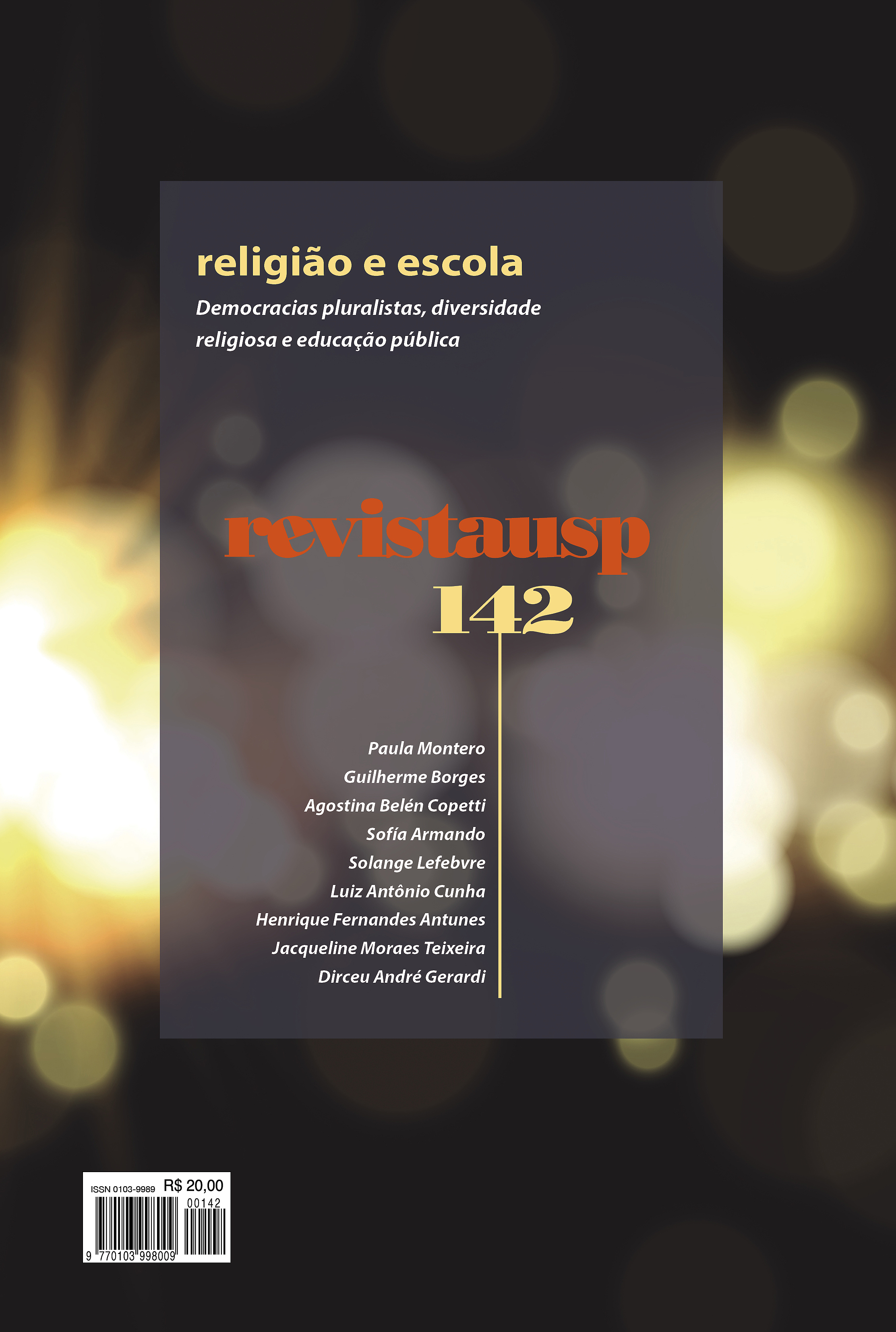Ensino religioso no Brasil e na Argentina: entre confessionalidades e laicidades
DOI:
https://doi.org/10.11606/issn.2316-9036.i142p13-32Palabras clave:
Ensino religioso, Educação pública, Argentina, Brasil, Supremo Tribunal FederalResumen
O ano de 2017 foi crucial para a definição do lugar do ensino religioso na educação pública tanto do Brasil quanto da Argentina. Com uma diferença de menos de três meses entre uma decisão e outra, os Supremos Tribunais desses países trataram da constitucionalidade das normas que garantiam a oferta e a ministração dessa disciplina em estabelecimentos do Estado. Neste artigo, revisaremos as justificativas apresentadas pelos tribunais para apoiar suas decisões, investigando nesses contextos como o senso comum jurídico molda, define e estabelece os limites do religioso e do não religioso. Em outras palavras, mais do que avaliar o mérito e a legitimidade da implementação do ensino religioso em escolas públicas, nosso objetivo é tornar visíveis as narrativas e discursos através dos quais os membros dos Supremos Tribunais Federais dos dois países em análise dão materialidade ao que entendem por (não) religião.
Descargas
Referencias
ARGENTINA. Instrucción religiosa en horarios de clase – Provincia de Salta – planteo de inconstitucionalidad (Castillo, Carina Viviana y otros c/ Provincia de Salta – Ministerio de Educación de la Prov. de Salta s/ amparo). Buenos Aires, Corte Suprema de Justicia de la Nación, 2017. Disponível em: https://defensoria.org.ar/normativas-cdh/castillo-carina-viviana-y-otros-c-provincia-de-salta-ministerio-de-educacion-de-la-prov-de-salta-s-amparo/.
BRASIL. Constituição da República Federativa do Brasil de 1988. Brasília, Presidência da República – Subchefia para Assuntos Jurídicos, 1988. Disponível em: https://www.planalto.gov.br/ccivil_03/constituicao/constituicao.htm.
BRASIL. Lei n. 9.475, de 22 de julho de 1997. Brasília, Presidência da República – Subchefia para Assuntos Jurídicos, 1997. Disponível em: https://www.planalto.gov.br/ccivil_03/leis/l9475.htm.
BRASIL. Decreto n. 7.107, de 11 de fevereiro de 2010. Brasília, Presidência da República – Subchefia para Assuntos Jurídicos, 2010. Disponível em: https://www.planalto.gov.br/ccivil_03/_ ato2007-2010/2010/decreto/d7107.htm.
BRASIL. Ação Direta de Inconstitucionalidade 4.439 – Voto do Ministro Marco Aurélio. Brasília, Supremo Tribunal Federal, 2017a. Disponível em: https://www.conjur.com.br/wp-content/uploads/2023/09/voto-marco-aurelio-ensino-religioso-1.pdf.
BRASIL. Ação Direta de Inconstitucionalidade 4.439 – Voto do Ministro Edson Fachin. Brasília, Supremo Tribunal Federal, 2017b. Disponível em: https://www.stf.jus.br/arquivo/cms/noticiaNoticiaStf/anexo/VotoFachinEnsinoReligioso.pdf.
BRASIL. Ação Direta de Inconstitucionalidade 4.439 – Voto do Ministro Dias Toffoli. Brasília, Supremo Tribunal Federal, 2017c. Disponível em: https://www.conjur.com.br/wp-content/uploads/2023/09/toffoli-adi-ensino-religioso.pdf.
BRASIL. Ação Direta de Inconstitucionalidade 4.439 – Voto do Ministro Alexandre de Moraes. Brasília, Supremo Tribunal Federal, 2017d. Disponível em: https://www.stf.jus.br/arquivo/cms/noticiaNoticiaStf/anexo/ADI4439AM.pdf.
DI STEFANO, R. “El pacto laico argentino (1880-1920)”. PolHis, n. 8, 2012, pp. 80-9. Disponível em: https://historiapolitica.com/datos/boletin/polhis8_DiSTEFANO.pdf.
ESQUIVEL, J. C. “Notas sobre la laicidad en Argentina”. Debates Do Ner, n. 18 (year 11), 2010, pp. 149-71.
GONDRA, J. G.; SCHUELER, A. Educação, poder e sociedade no Império brasileiro. São Paulo, Cortez, 2008.
MALLIMACI, F. El mito de la Argentina laica: catolicismo, política y Estado. Buenos Aires, Capital Intelectual, 2015.
MONTERO, P. “Ensino religioso escolar nos votos do STF: a religião como crença”. Estudos de Religião, v. 37, n. 1, 2023a, pp. 43-64.
MONTERO, P. “Da liberdade religiosa ao pluralismo: a diversidade como valor no ensino religioso escolar no Paraná”. Horizontes Antropológicos, n. 65, v. 29, 2023b, pp. 1-36.
OLIVEIRA, G. G. “Educação, laicidade e pluralismo: elementos para uma genealogia dos debates sobre o ensino religioso no Brasil”. Revista Teias, nº 36, v. 14, 2014, pp. 43-60. Disponível em: https://www.e-publicacoes.uerj.br/revistateias/article/view/24383.
QUACK, J. “Outline of a relational approach to ‘nonreligion’”. Method & Theory in the Study of Religion, 26 (4-5), 2014, pp. 439-69.
RODRÍGUEZ, L. G. “Enseñanza religiosa y educación laica en las escuelas públicas de Argentina (1884 a 2015)”. Prohistoria, v. 21, n. 30, 2018, pp. 183-206. Disponível em: https://www.memoria.fahce.unlp.edu.ar/art_revistas/pr.13947/pr.13947.pdf.
TORRES, G. “Iglesia católica, educación y laicidad en la historia argentina”. Revista História da Educação, v. 18, 2014, pp. 165-85. Disponível em: https://seer.ufrgs.br/index.php/asphe/article/view/42976.
YOUNG, I. M. “Communication and the other: beyond deliberative democracy”, in S. Benhabib (org.). Democracy and difference. Nova Jersey, Princeton University Press, 1996, pp. 120-35.
Descargas
Publicado
Número
Sección
Licencia
Derechos de autor 2024 Revista USP

Esta obra está bajo una licencia internacional Creative Commons Atribución-NoComercial-CompartirIgual 4.0.
|
Pertence à revista. Uma vez publicado o artigo, os direitos passam a ser da revista, sendo proibida a reprodução e a inclusão de trechos sem a permissão do editor. |
Datos de los fondos
-
Fundação de Amparo à Pesquisa do Estado de São Paulo
Números de la subvención 2022/13618-1;2021/14038-6 -
Consejo Nacional de Investigaciones Científicas y Técnicas
Números de la subvención 2021-1252-APN-DIR


